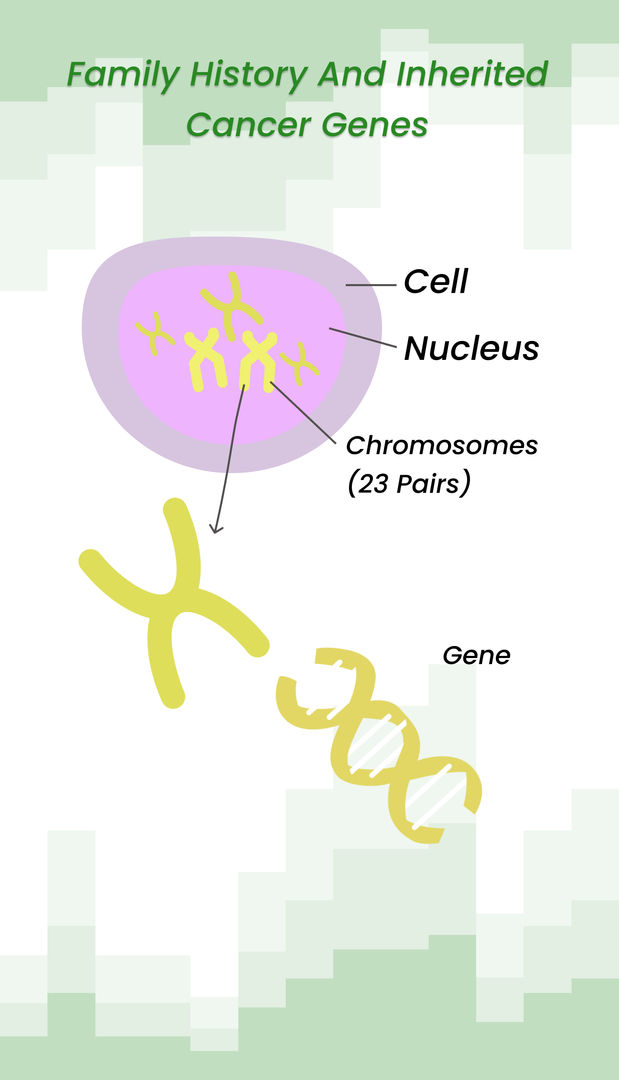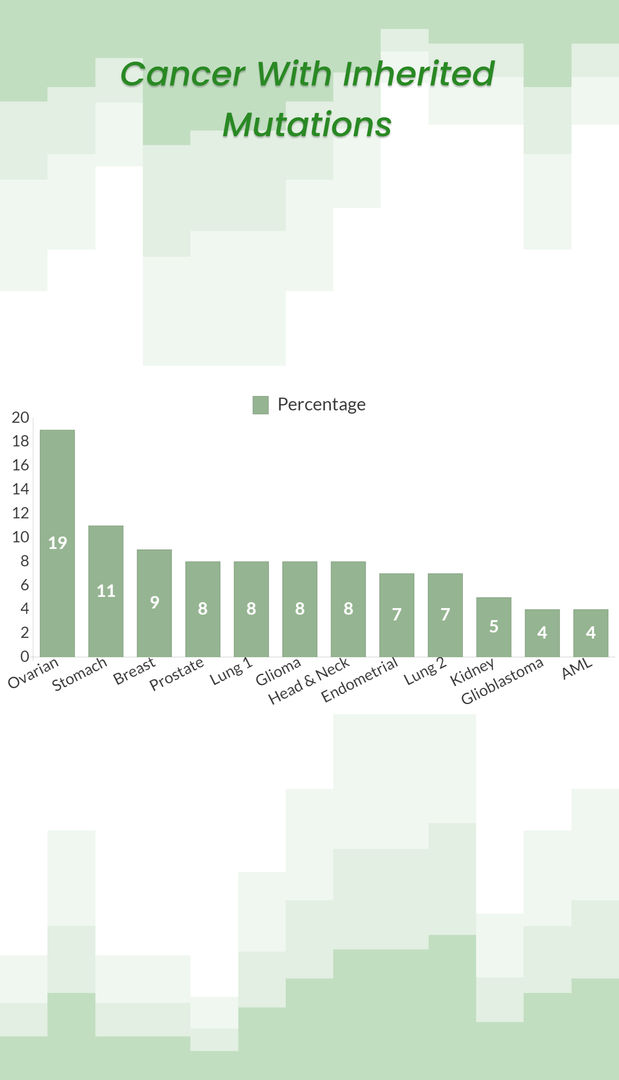Overview
Cancer cells differ from healthy cells in that they switch off genes that would govern their growth and turn on genes that assist them in growing or multiplying. It is important to recognize that cancer cells and all of our body's cells share around 22,000 genes.
When we talk about cancer genetics, we're referring to these two distinct but interconnected types of genetics.
Most cancers are caused by mutations that arise exclusively within the cancerous cells or tissues rather than by an inherited, hereditary vulnerability. The great majority of cancers emerge by chance due to what we call "sporadic mutations," with only 5% to 10% caused by genes that we are born with.
The Connection Between Genetics and Cancer
Genetic mutations can cause changes in the function of cells, leading to uncontrolled growth and cancer development. Some genetic mutations may also make a person more susceptible to developing cancer, but they do not directly cause cancer.
Many different types of genetic mutations can lead to cancer development, and researchers are constantly working to understand the genetic basis of this disease.
Let's find out what genetic changes can cause cancer.
Genetic Changes That Can Cause Cancer
Cancer can be caused by genetic mutations that alter how your cells develop and spread. The majority of cancer-causing DNA mutations occur in genes, which are portions of DNA that contain the instructions for making proteins or specialized RNA like microRNA.
- Some DNA alterations, for example, increase the quantities of proteins that tell cells to keep growing. Other DNA modifications reduce the quantities of proteins that signal when cells should cease growing. Furthermore, some DNA alterations prevent proteins from telling cells to self-destruct when they are damaged.
- Scientists believe that more than one DNA alteration is required for a healthy cell to become malignant. Cancer-related genetic modifications require fewer further changes in people who have inherited them.
- Cancer cells acquire additional DNA alterations whenever they divide. Different DNA alterations can occur in cancer cells within the same tumor. Furthermore, every cancer patient has a unique combination of DNA alterations in their malignancy.

Many different types of genetic mutations can cause cancer. Some of the most common types of genetic changes that can lead to cancer include:
- Point mutations: Point mutations are changes in a single DNA base. These mutations can alter a gene's function, leading to cancer development.
- Insertions and deletions: Insertions and deletions are changes in the number of DNA bases in a gene. These mutations can cause genes to malfunction, leading to cancer development.
- Chromosomal rearrangements: Chromosomal rearrangements are changes in the structure of chromosomes. These mutations can lead to the activation of oncogenes (genes that promote the growth of cancer cells) or the inactivation of tumor suppressor genes (genes that inhibit the growth of cancer cells), resulting in cancer development. Radiation therapy, often used in cancer treatment, employs high-energy radiation to target and destroy cancer cells. It works by damaging the DNA within these cells, inhibiting their ability to multiply.
- Epigenetic changes: Epigenetic changes are changes in how genes are expressed without changing the DNA sequence. These changes can affect the function of genes, leading to cancer development.
Is Cancer Hereditary?
Some types of cancer are hereditary, meaning they can be passed down from one generation to the next through changes in the genetic material of cells. These inherited genetic mutations are present in every body cell and can increase a person's risk of developing certain types of cancer.
It is important to note that an inherited genetic mutation does not necessarily mean a person will develop cancer. Many people with inherited genetic mutations never develop the disease, and even those who do may not develop it until later in life.
Krista Elkins, a registered nurse (RN) and paramedic (NRP) with 20 years of experience, shared her opinion about whether cancers that run in families are always hereditary or not. According to her,
"Cancers in families are not always passed down through the generations. Offspring may inherit genetic mutations, increasing their likelihood of getting cancer. However, certain cancers, such as breast and colorectal cancer, are more likely to develop in families."
However, having an inherited genetic mutation can increase a person's risk of developing cancer. Individuals with a family history of cancer need to discuss their risk with a healthcare provider and take steps to reduce it.
What Types Of Cancers Can Be Hereditary?
Only 5-10% of all cancer cases are caused by genetic abnormalities, whereas the rest, 90-95%, are caused by environmental and lifestyle factors. It is estimated that between 3 and 10 in every 100 cancers are associated with an inherited faulty gene.
Some types of cancer are more likely to be hereditary than others. Some of the most common types of hereditary cancer include:
1. Breast cancer: Inherited genetic mutations in the BRCA1 and BRCA2 genes are the most common cause of hereditary breast cancer. Women with these mutations have a much higher risk of developing breast cancer than those without the mutations.
2. Ovarian cancer: Inherited genetic mutations in the BRCA1 and BRCA2 genes are also associated with an increased risk of developing ovarian cancer.
3. Colorectal cancer: Inherited genetic mutations in the MLH1, MSH2, MSH6, and PMS2 genes can increase a person's risk of developing colorectal cancer.
4. Prostate cancer: Inherited genetic mutations in the BRCA1 and BRCA2 genes have been associated with an increased risk of developing prostate cancer.
5. Pancreatic cancer: Inherited genetic mutations in the BRCA1 and BRCA2 genes and the PALB2 gene have been linked to an increased risk of developing pancreatic cancer.
If you have a family history of cancer, you must talk to your healthcare provider about your risk and the steps you can take to reduce your risk.

How to know if You Are at Risk for Hereditary Cancer?
Some of the common signs that you may be at risk for hereditary cancer include:
- Multiple family members on the same side of your family have been diagnosed with cancer, especially at a young age.
- Multiple family members on the same side of your family have the same type of cancer.
- You have a family member diagnosed with a rare or inherited cancer syndrome, such as Lynch syndrome or BRCA1/BRCA2 mutation.
- You have a family history of cancer associated with a known genetic mutation, such as breast cancer and the BRCA1/BRCA2 mutation.
Your healthcare provider can help you understand your risk and recommend steps you can take to reduce it, such as genetic testing or increased cancer screening.
Should You Get Genetic Testing For Cancer Risk?
Whether or not to get genetic testing for cancer risk is a personal decision that you should make after considering several factors. People with a strong family history of cancer may be interested in learning more about their DNA. This may assist the individual or other family members in planning their future health care. Because hereditary mutations impact all cells in a person's body, genetic testing on blood or saliva (spit) samples can typically detect them.
According to Krista Elkins,
"Because everyone has BRCA genes inherited from their parents, it is unnecessary to get tested unless breast cancer predominantly runs in their families, so they are likely inheriting a mutated version of the gene. It is not recommended that children under 18 be tested for the BRCA gene. It is important to keep in mind, and I have seen this more and more lately in healthcare, that men can also have breast cancer!"
Some of the critical things to consider when deciding whether to get genetic testing for cancer risks include the following:
- If you have a family history of cancer, mainly if multiple family members have been diagnosed with the same type of cancer, you may be at increased risk of carrying a hereditary genetic mutation that increases your risk of developing cancer. In this case, genetic testing may be beneficial.
- Genetic testing can help you understand your risk of developing cancer and guide your decisions about your health. For example, suppose you have a hereditary genetic mutation that increases your risk of breast cancer. You may choose to have more frequent breast cancer screenings or even consider preventive surgery to reduce your risk.
You should make it after careful consideration and discussion with your healthcare provider. They can help you understand the potential risks and benefits of genetic testing and support you in making the right decision.
How to Prevent Genetic Cancer?
There is no sure way to prevent genetic cancer. However, there are steps you can take to reduce your risk of developing cancer, whether it is hereditary or not. Some of the ways you can reduce your risk of developing cancer include:
- Limit alcohol consumption: Drinking excessive amounts of alcohol can increase your risk of developing certain types of cancer, such as breast, liver, and colorectal cancer. Limiting your alcohol consumption can help to reduce your risk.
- Get regular cancer screenings: Cancer screenings can help to detect cancer early when it is most treatable. Talk to your healthcare provider about which cancer screenings are proper for you, and ensure you get screened regularly.
- Eat a healthy diet: A healthy diet rich in fruits, vegetables, and whole grains can help reduce your risk of developing cancer. It is also essential to limit your intake of processed and red meats, as well as sugary and fatty foods.
- Exercise regularly: Regular physical activity has been shown to reduce the risk of developing cancer and many other chronic diseases. Aim for at least 30 minutes of moderate-intensity exercises daily, such as brisk walking.
Overall, while it is impossible to completely prevent genetic cancer, taking steps to reduce your risk can help improve your overall health and well-being.






